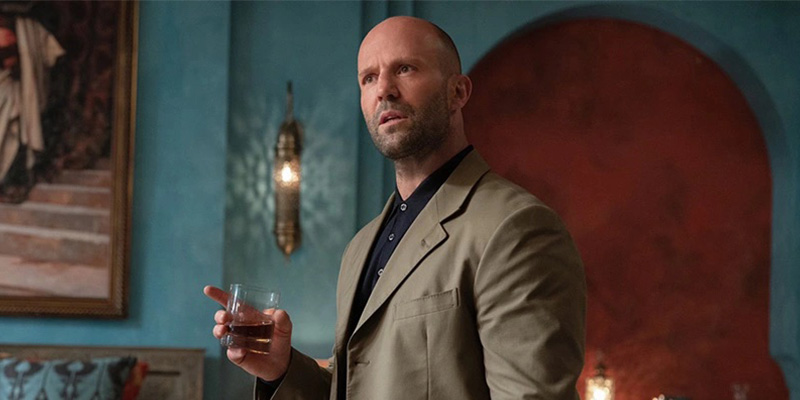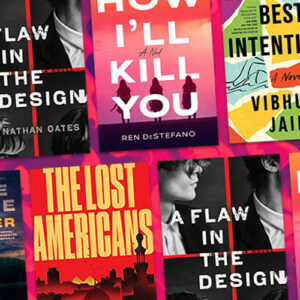I don’t know who showed up to Operation Fortune: Ruse de Guerre with lofty expectations, but I was not one of them. No, I went to the movies at the end of a long, hard week because I wanted—I needed—to watch scenes full of computer screens blinking with face-matching algorithms, and bald men growling into earpieces, and the slain bodies of henchmen rolling down flights of stairs, and people typing really fast on keyboards before announcing “I’m in,” and this seemed to be the kind of film that could give those things to me.
Operation Fortune: Ruse de Guerre did not get rave reviews across the board, which I think is a bit unfair, because it is a movie that seems exactly like the kind of movie it is, and I think that should count for something. Negative reviews should be for when a film is a disappointment. Anyone who was disappointed by Operation Fortune, or who expected more from it, must have forgotten that the film is called “Operation Fortune“—and not only that, but also that it gives itself a secondary title in French, which is in fact never a sign of quality.
Anyway, I had a very good time watching Operation Fortune. I would have had a better time if the seats in my movie theater were recliners, because it was really the kind of movie you want to “lie down to.” There are Sunday Afternoon Cable Movies, and then there are Thursday Night at 1 AM Cable Movies, and this is that. It’s the kind of movie you half-watch while you’re waiting for your kid to come home from the prom. I assume.
I enjoy films where “really good driving” and “really bad driving” are the same kind of driving.The movie, which is directed and co-written by Guy Ritchie, follows the operatives of a slick security firm contracted by the British government as they attempt to retrieve something important that was stolen from someplace. No one knows what was stolen or who has it, but it’s important, and they’ve got to go get it. Sometimes it’s in a suitcase, other times it’s in a flashdrive, other times it needs to be downloaded onto phones. In other words, welcome to MacGuffin City!
Cary Elwes is Nathan, and he helms the team, and his top agent is a guy named Orson Fortune (Jason Statham). Yes, Orson Fortune, soon to be the name of my firstborn child. As soon as I heard the name “Orson Fortune,” at like the four minute mark, I knew for sure that this movie would please me. Orson. Fortune. Say it with me now.
Right, so, because their go-to tech guy John had been poached by rival contractor Mike (Peter Ferdinando), who also appears to be hunting for this thing that they’re hunting for, Cary Elwes hires two “footmen” with versatile skills: Sarah (a wisecracking Aubrey Plaza, having the time of her life), and JJ (the rapper Bugzy Malone). Realizing that the thing they’re looking for is now in the hands of an arms dealer named Greg (Hugh Grant), they go to LA to blackmail his favorite movie star, Danny Francesco (Josh Hartnett), to help them ingratiate themselves into Greg’s world to go get the thing. Sooner or later, they all wind up on the Turquoise Coast and there are break-ins, car chases, yacht parties, a vespa chase through the bumpy city streets, all that jazz.
At one point while driving on a winding, cliffside road, Josh Hartnett whips his car around so that Aubrey Plaza can stick her skinny, musclebound arms out the window and shoot the guys pursuing them, and I felt a great sense of comfort and satisfaction wash over me. I’m so happy for Aubrey Plaza, who deserves more scenes like this, in all movies. But I was happy in a general way, too, because I had been hoping this movie would have a few bonkers car chases. I enjoy films where “really good driving” and “really bad driving” are the same kind of driving. I don’t want to be on the road with a car that seems like it’s being driven by one of those Von Trapp marionettes, but I do want to watch what that would look like, from somewhere very high up.
As much fun as I had, I was left wondering a few things. Mostly about narrative choices. I’ll record them here.
- The film is subtitled “Ruse de Guerre,” which means “ruse of war,” which means “military deception.” This is not an accurate description of the plot of Operation Fortune, but it was probably chosen as the subtitle because it’s the phrase the characters say the most in the whole film. They say it a lot. I’m not kidding. They say it like twenty times. Whenever anything happens, characters go, “ah yes, ruse de guerre.” Does the film think this is some sort of common idiom, a phrase everyone uses all the time? Is it trying to make it a thing? I need to know.
- On set, was there some sort of current-events expert who didn’t show up? Because, sadly, I don’t think the writers made the greatest choices in terms of which political regimes to associate with which group of people. For example, the villains are all from Ukraine, and they want to blow up the world, and also at one point, the gang seeks refuge in Qatar. Did the writers intend to posit a fascinating, controversial arrangement of global politics, or did someone just throw some darts at a map on the wall?
- At an early point in the film, at a stopover in Madrid, the gang has to intercept the courier delivering the stolen item to the parties who want it. Aubrey Plaza gets on the comms unit and tells a few lady operatives named Jane and Marcia to get in position to pick up the mark. We have never seen them before, and will never see them after this scene. I feel like we get to know Jane and Marcia very well, though, because we hear their names said a million times over the channel, so why don’t they come back? Is it a money thing? Are they too expensive to rent for a whole operation, as opposed to a day? Are they freelance agents, or people who didn’t list a category on TaskRabbit?
- The bagman they are trying to intercept is an elderly Spanish professor in a tweed jacket, thoroughly unprepared for the kind of intrigue that Orson Fortune lives by. The gang saves him from being kidnapped by that rival guy Mike’s team by kidnapping him themselves (but in a more gentle way), and while he’s in their van and they’re unpacking the stolen item, he has a heart attack (!!!!) and wheezes about how the only reason he became a courier is because “they have my wife!” He begs them to find whoever has his wife and “save her.” AND THEY DON’T!! He dies right there and Mike, who has been chasing them, pulls them over and is like, oh, why is the courier dead in your van, and Jason Statham is like, you and your thugs “scared him TO DEATH” and Mike’s like, jeez, this blows, where’s the shovel. And that’s it! No one ever brings up this guy again or looks for his wife or even asks the bad guys later on if they happen to have seen a middle-aged Spanish lady chained up somewhere. So like, is she okay? Did she die? Why do they not care about these nice old people? Is she sitting in a warehouse with duct-tape over her mouth, wondering when those Ukrainians or maybe Hugh Grant’s men or those two random evil two Silicon Valley entrepreneurs who show up later (it’s VERY unclear who the main bad guy is) are going to come back? Alternatively, how long does it take her husband to deliver a package?
- Hugh Grant spends the whole movie talking like he’s doing a Michael Caine impression, like a real “Bichael–Cayne” soundin’ ‘fing. Why is he doing this? Whose idea was it? Was it his?
- Follow-up: Why was Hugh Grant so grumpy at the Oscars, disdainfully calling the whole night a “vanity fair” (which, in its root sense, from Bunyan’s Pilgrim’s Progress, means “a place of frivolity”) when he seems perfectly fine saying things like “Orson Fortune, now that is a sexy name!” and “follow what I do, and what I do-do” while squashing all his glottal sounds like he’s Charlie bloody Croker?
- Follow-up: Was it because he had to be at the Oscars for free?
- There are a lot of jokes in this movie about wine. Why is that? Was it because some script doctor thought the characters didn’t seem real enough because they didn’t have any hobbies, and so they picked viticulture? (If so, “a lack of hobbies” isn’t why they don’t seem real!) There are even lots of jokes about how Cary Elwes charges the British government for lots of wine, claiming that Orson says he needs it for medicinal purposes, but then also sometimes, Orson seems to be the one who is drinking all the wine. Is this actually a very interesting movie about the private sector getting kickbacks from the national defense budget? Do the taxpayers know? What is going on here?
- When’s the sequel?

















